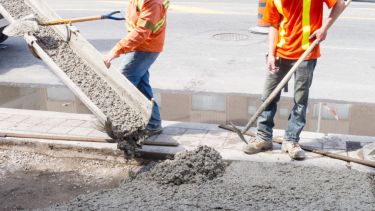The UK’s race to reach net-zero is rapidly transforming two of its most carbon intensive industries – steel and cement. However new research warns that progress in one, could hinder the other with major implications on the nation’s climate strategy.
A study lead by researchers at the University of Sheffield, supported by White Rose Consortium colleagues from the University of Leeds, has found that the UK steel industry is on track to cut its carbon emissions by up to 84% by 2050 through a conversion to greener forms of steelmaking alongside the UK’s rapid move to cleaner energy sources. While ahead of the global average, the change could impact the supply of an important material the UK cement sector relies on to lower its own carbon footprint.
Ground granulated blast furnace slag (GGBS) is a co-product of traditional steelmaking that is widely used in blended cements as a supplementary cementitious material to enhance performance, and cut associated emissions by reducing the amount of new clinker used; the main ingredient in traditional cement.
“The steel and cement industries in the UK have long shared a symbiotic relationship”, explained Jacob Whittle, Researcher at the University of Sheffield. “Primary steelmaking produces GGBS which can be used in cement to lower its embodied emissions by avoiding the use of new clinker, but as UK steel rapidly decarbonises this link will inevitably weaken. With few alternatives yet viable at scale, the cement sector needs to rapidly invest in new approaches to reduce its own emissions.”
The research which combined material flow analysis, life cycle assessment and economic modelling, highlights the impending challenge to the cement sector caused by a changing domestic steel production; that without the accelerated development of alternative supplementary cementitious materials or the opening of new supply chains, UK cement manufacturers are predicted to become reliant on GGBS (or unground material) imports from distant producers to ensure that UK cement continues to reduce its embodied carbon.
Hisham Hafez, Research Fellow at the University of Leeds, explains “Our analysis indicates that this would expose producers to global market volatility, where demand consistently outpaces supply, potentially rendering GGBS a financially unviable material.”
The study also stresses that although UK steel is on a swift decarbonisation trajectory, it must take action to ensure that domestic iron and steel supply chains will be able to support its transition; otherwise, it too is at risk of over reliance on complex, volatile global supply chains for sources of recyclable material.
Despite the risks, Madeline Rihner, Researcher at University of Sheffield explains there are possible solutions. “A clear strategic framework and targeted policies are needed to advance balanced decarbonisation pathways, ensuring that the pursuit of net-zero does not create unintended risks for these foundational industries.”
“Steel and cement are vital materials which are found in nearly every aspect of modern life, from housing to transport”, said Professor Lenny Koh, Director of the Advanced Resource Efficiency Centre and Co-head of the Energy Institute at the University of Sheffield. “Ensuring that their paths to net-zero are symbiotic and synergistic, is essential for truly resilient infrastructure in the UK for years to come.”
Read the full paper here.

